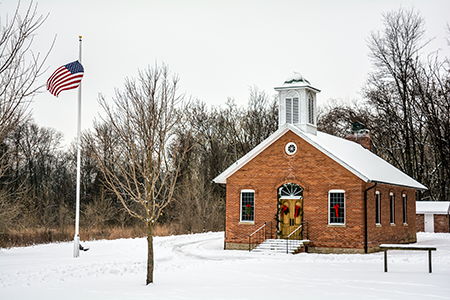
An unusual custom pioneer children observed on Christmas Day was “turning out” or locking out the schoolteacher from the schoolhouse unless the teacher was prepared to supply a treat. This practice was common in the country schools. The teacher who showed up empty-handed faced a school rebellion.
Christmas was recognized in primarily a religious way in the early days of the 1800s. There were no celebrations at home in the way of gift giving. Children went to school on Christmas Day, just like any other day of the week. It was customary for a teacher to have a Christmas “treat” for his students. In Indiana, the treat would usually be candy, apples, ginger cakes and a day of playing games.
If, on Christmas morning, the students anticipated that their teacher would refuse to “treat,” or he made no preparations for Christmas, the students would either block the door to the school house or “turn out” the teacher until their demands of a treat were met. What followed depended on the teacher. Some teachers resisted, and others went along with it with good humor. Those that resisted did so without the support of the community. This legalized rebellion of the students against the schoolmaster had parental and District Trustees approval. The District Trustees were known to keep a watchful eye on the rebellions to keep them from getting out of hand
At times the rebellion became a real battle of wits. One account told of a teacher snuffing out the school’s main source of heat by pouring water down the school house chimney. Another tale involved threats to the teacher of a dunking in an icy cold creek. This was done on more than occasion and thwarted on other occasions by the watchful eyes of Trustees. One tale involved a teacher being bound hand and foot, with another of a teacher taking an ax to the door. Unbelievable as it may seem, the teacher was expected to forgive his enemies, and retaliation against the students has never been recorded.
One teacher turned the occasion into a life lesson for his students. The teacher, on reaching the school house, was refused entrance until a treat was given. The teacher declined the student’s oral demands, and proposed the students present their demands in writing. This seemed reasonable, so the students put their demands on paper and handed the paper to the teacher outside. The teacher wrote beneath the students’ script “I except to the above proposition,” and signed his name. The students, being satisfied with the document, opened the door and let in the teacher. Once inside, the teacher asked the students to once again look at the document. The teacher told the students they should read with care what the teacher had written. It is one thing to “accept” a proposition and quite another to “except” it. The students were crestfallen, and acknowledged their mistake. The teacher warned the students against the evil of carelessness in business transactions. The teacher then generously treated the children their Christmas custom and was thereafter loved and respected by his students.
The act of the Christmas Rebellion faded away by 1888, according to Elba Branigin, who told of this custom in the “History of Johnson County Indiana.” Another telling of this custom was made by Oliver Johnson in his book “A Home in the Woods.” These true stories help to remind us that our rich historical past is worth keeping and retelling. I encourage you to explore the many history books in the Historical Room at your Johnson County Public Library.
History of Johnson County, Indiana / Elba L. Branigin (1913)
A Home in the Woods: a pioneer's life in Indiana: Oliver Johnson's Reminiscences of Early Marion County
Read it online
Find a copy at JCPL


